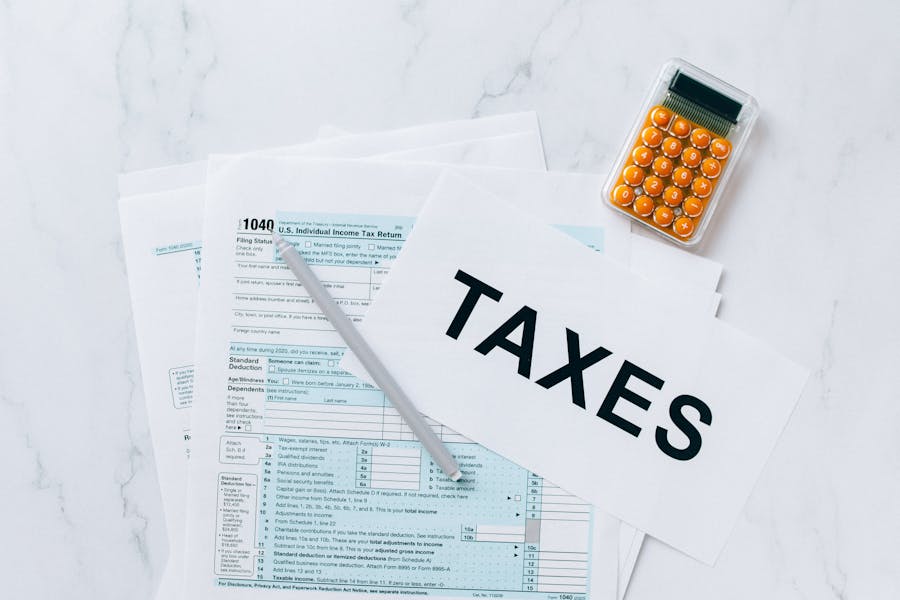If you’ve missed filing taxes in previous years, you may wonder, “How far back can you file taxes?” The good news is that the IRS allows taxpayers to file returns for prior years, but there are specific rules and deadlines to consider. Whether you’re looking to reclaim a refund, avoid penalties, or resolve unpaid taxes, understanding these guidelines is essential. Late filings can carry significant financial consequences, but they can also present opportunities for individuals entitled to refunds or credits. In this guide, we’ll explain how far back you can file taxes, what to expect, and how to navigate the process smoothly.
How far back can you file taxes?
You can typically file federal taxes for up to three years to claim a refund. However, if you owe taxes, there is no time limit for filing past-due returns. Filing as soon as possible helps avoid penalties and interest. Contact the IRS for assistance or consult a tax professional to ensure compliance with regulations.
Everything You Need to Know About Filing Back Taxes
The Internal Revenue Service (IRS) has established clear guidelines on how far back taxpayers can file returns. Generally, individuals have three years from the original due date of a tax return to file and claim a refund. For instance, if your 2020 tax return was due on April 15, 2021, you have until April 15, 2024, to file and secure any refunds you may be entitled to. After this three-year window closes, the IRS will no longer issue refunds for that tax year, and any credits or deductions you were eligible for will be permanently forfeited.
However, the rules differ if you owe taxes. In such cases, there is no statute of limitations for filing past-due returns. While you can file at any time, the IRS begins accruing penalties and interest immediately after the original filing deadline has passed. These financial repercussions can grow significantly over time, making it essential to address unfiled taxes as soon as possible. Additionally, filing your back taxes can help you avoid potential legal actions from the IRS, such as wage garnishments, property liens, or levies.
Understanding your state tax obligations is just as important as your federal tax responsibilities. State tax agencies may have different filing deadlines and penalty structures, which can add further complexity to the process. It is crucial to familiarize yourself with both federal and state requirements to ensure compliance and avoid unnecessary complications. Seeking advice from a tax professional can provide clarity and help you navigate the nuances of filing taxes for previous years effectively.
To successfully file back taxes, keeping accurate and organized records is essential. Gather all relevant documents, such as W-2s, 1099s, and receipts for deductions, to ensure that your returns are accurate and complete. Proper documentation not only streamlines the filing process but also minimizes the risk of errors or disputes with the IRS. Taking these steps will help you meet your tax obligations and potentially recover refunds or credits you may have missed.
Why Filing Back Taxes Is Important
Avoid Penalties and Interest
Failing to file your taxes on time results in significant financial consequences imposed by the IRS. Penalties include a failure-to-file penalty of 5% per month and a failure-to-pay penalty of 0.5% per month, both of which can accumulate up to a maximum of 25% of the unpaid amount. In addition to penalties, interest is charged daily on the outstanding balance, further increasing the financial burden. Filing back taxes as soon as possible helps minimize these penalties and reduces the overall cost of non-compliance. By taking immediate action, taxpayers can prevent these financial repercussions from compounding further.
Claim Missed Refunds
Filing within the IRS’s three-year window allows taxpayers to claim refunds they may be entitled to. Refunds often arise from overpayments, Earned Income Tax Credits (EITC), and other deductions or credits that were not utilized during the original filing period. Missing this three-year window results in forfeiting these funds, as the IRS does not issue refunds beyond this period. Filing back taxes promptly ensures that eligible taxpayers can recover money owed to them and benefit from financial opportunities they may have missed in previous years.
Restore Eligibility for Government Programs
Unfiled taxes can have long-term effects on eligibility for government programs, such as Social Security and Medicare. These programs rely on accurate earnings reports from tax filings to calculate benefits. When taxes remain unfiled, your earnings may not be fully recorded, which could reduce or delay future benefits. Filing back taxes ensures that your income history is properly documented, preserving your eligibility for these essential programs.
Avoid Legal Consequences
Failure to file taxes can lead to serious legal implications, including audits, wage garnishments, and property liens. The IRS views non-compliance as a significant offense and may take enforcement actions to recover unpaid taxes. Filing your past-due returns demonstrates a willingness to comply with tax laws, reducing the likelihood of legal actions and resolving issues before they escalate.
Improve Financial Standing
Filing past-due returns helps taxpayers gain a clear understanding of their financial situation. This clarity allows individuals to address outstanding tax debts and explore available solutions, such as installment agreements or other IRS assistance programs. Filing back taxes is often a necessary first step toward resolving financial issues and regaining control over personal finances. By becoming compliant with tax obligations, individuals can create a pathway to financial stability and peace of mind.
Steps to File Taxes for Previous Years
Filing taxes for previous years can be made easier by following these steps:
- Gather Your Documentation: Start by collecting all the necessary paperwork for the tax years you need to file. This includes income-related forms such as W-2s, 1099s, and any other relevant documents. Additionally, locate receipts, invoices, or records for deductible expenses like medical bills, education costs, or business-related expenditures. Having organized and accurate records ensures your tax return is both complete and error-free.
- Download Tax Forms: Visit the IRS website to find the correct tax forms for the specific years you need to file. Each tax year requires its forms and instructions, so make sure you’re using the appropriate ones. Carefully follow the instructions included with each form to accurately calculate your taxes and apply for any eligible deductions or credits.
- Consult a Tax Professional: If you’re unsure about how to handle certain aspects of filing, such as claiming deductions or addressing complex financial situations, seek help from a tax professional. A qualified tax preparer or accountant can help identify errors, maximize your refund, and ensure compliance with IRS regulations. Their expertise is especially helpful for addressing complicated filings or resolving discrepancies.
- Submit Your Return: Once your forms are complete, mail your returns to the IRS address specified for the relevant tax year. For added security and peace of mind, use certified mail or a mailing service with tracking to confirm delivery. This ensures that your submission is received and processed by the IRS.
- Resolve Outstanding Balances: If you owe taxes, pay as much as you can upfront to reduce the accumulation of penalties and interest. If paying the full amount isn’t possible, you can set up an installment agreement with the IRS to manage your payments over time. The IRS provides flexible payment options to help taxpayers become compliant without overwhelming financial strain.
Common Questions About Filing Back Taxes
Claiming refunds for taxes older than three years is generally not allowed by the IRS. According to IRS guidelines, taxpayers have a three-year window from the original due date of a tax return to file and claim a refund. For example, if your tax return for 2020 was due on April 15, 2021, you would have until April 15, 2024, to file and claim any refunds owed to you. Once this three-year period has passed, the IRS will not issue a refund, and any credits or deductions you might have been eligible for will be forfeited. This makes it essential to act quickly if you suspect you are owed money from prior tax years.
If you are unable to locate your old W-2s or other income-related documents, there are ways to retrieve this information. Start by contacting your employer or former employers for copies of the missing W-2s. Most employers are required to maintain records and can provide duplicates upon request. If obtaining the documents from your employer is not an option, you can request a wage and income transcript directly from the IRS. This transcript contains information reported by your employers, such as wages, tips, and other income details, which can help you accurately complete your tax return.
When it comes to filing prior-year returns, it’s important to note that e-filing is usually only available for the current tax year. Most past-due returns must be submitted by mail. You’ll need to download the appropriate tax forms for the relevant years from the IRS website, complete them manually, and send them to the IRS address listed in the instructions. It’s a good idea to use certified mail or a mailing service with tracking to ensure your return is received.
Acting promptly and staying organized can help you successfully file past-due returns, even if the process requires additional steps to retrieve documents or complete manual filings. While filing old taxes may seem daunting, taking these steps ensures compliance and avoids missed opportunities for refunds or other financial benefits.
Filing Back Taxes: Tips and Best Practices
- Maintain Clear Records: Keeping detailed records of your income and deductions is essential to simplify the tax filing process, especially for back taxes. Gather all necessary documents, including W-2s, 1099s, receipts, and other financial statements. Organize these records by year to ensure accuracy and completeness when filing past-due returns. Using tax preparation software or seeking assistance from a tax professional can further streamline the process and reduce the risk of errors.
- Explore IRS Programs: The IRS offers several programs to help taxpayers manage back taxes and resolve debts. One such program is the Fresh Start Initiative, which provides options like installment agreements and penalty relief for eligible individuals. These programs are designed to ease the financial burden of unpaid taxes and encourage compliance. Researching and taking advantage of these resources can help you settle your tax obligations in a manageable way.
- Address State Tax Obligations: Filing back taxes isn’t limited to federal returns—state tax obligations must also be addressed. State tax agencies often have different rules, deadlines, and penalties for late filings. Failing to file state taxes can result in additional fines or legal consequences. To avoid complications, check your state’s specific requirements and ensure that all returns are filed at both the federal and state levels.
- Avoid Future Delays: To prevent the need for filing back taxes in the future, establish a system to stay on top of deadlines. Set reminders for tax due dates and use tax preparation software to simplify the filing process each year. Staying proactive about your tax obligations can help you avoid penalties, interest, and the stress of catching up on unfiled returns.
In Closing
Knowing how far back you can file taxes is critical for staying on top of your financial responsibilities and avoiding unnecessary penalties. The IRS permits filing for previous years, but taking swift action can make a significant difference. Promptly addressing back taxes allows you to minimize financial losses, claim any eligible refunds, and safeguard your financial stability. Staying informed about IRS guidelines and proactively managing your filings ensures you can resolve tax-related issues efficiently while maintaining full compliance. Acting now not only protects your financial future but also provides peace of mind.
FAQ’s
Q: How far back can you file taxes to claim a refund?
A: You can file taxes for up to three years after the original due date to claim a refund. After that, refunds are forfeited.
Q: What happens if you owe taxes but haven’t filed?
A: If you owe taxes, penalties and interest accrue until the balance is paid. The IRS encourages filing regardless of the time elapsed.
Q: Can I file old taxes online?
A: E-filing is typically only available for the current tax year. Prior-year returns must be mailed to the IRS.
Q: What if I don’t have my old tax documents?
A: You can request copies of W-2s or 1099s from employers or use the IRS transcript request service to obtain income information.
Q: Is there a penalty for not filing taxes?
A: Yes, the IRS imposes penalties for failing to file and pay taxes on time, including a 5% failure-to-file penalty and a 0.5% failure-to-pay penalty monthly.








